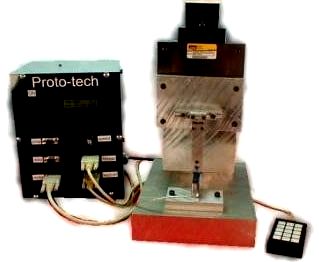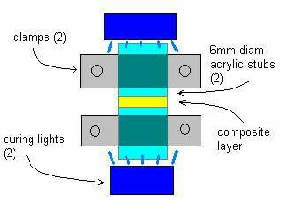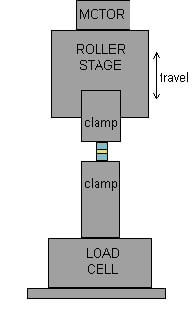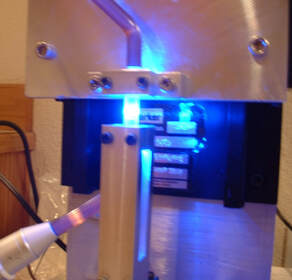Polymerization Stress Tester
|
The shrinkage that accompanies curing of dental composites is one of the leading drawbacks of this type of restorative material. Proto-tech has developed a new system that can accurately measure polymerization stress and shrinkage easily and affordably.
Based on the cylindrical testing geometry pioneered at ACTA and modified at OHSU, the Proto-tech polymerization stress tester uses a precision positioning table driven by a stepping motor and controlled by custom software. The preparations for each specimen are quick and easy to perform. A 200N load cell senses the polymerization stress that builds up during the curing process. Proto-tech’s special control algorithm allows the level of compliance correction can be adjusted up to 100% compensation for compliance of the load cell. The up and down motion of the positioning table is controlled through a command module. The testing program can be set to measure either the polymerization stress or the polymerization shrinkage of the composite. The testing fixtures allow for light curing to be directed to both the top and bottom sides of the specimen. |
|
The Pro-Test uses a special specimen clamp to hold either the acrylic or glass cylinders that the composite bonds to. Light-curing guns are aimed through the cylinders to cure the composite evenly and quickly. The stiff clamps and motor feedback prevent specimen shrinkage, so that a “zero compliance” situation is made. For the shrinkage test, a special control program commands the motor to absorb any further flexure during the test. This routine provides accurate and clinically realistic measurements.
|
|
The shrinkage measurement protocol uses a special program that instead “follows” the force of the composite shrinkage. This advanced routine is accurate to within 0.02% of strain and produces very repeatable results.
The instrument is composed of a mechanical testing frame and a power/control box with keypad and LCD readout. The Pro-Test is built from the finest positioning equipment from Parker/Daedal and load-sensing components by Interface. The instrument also includes:
The PC is equipped with Dataq recording software to monitor the force of the composite. This instrument, with its convenient testing geometry and advanced testing programs, allows new territory in polymer research to be explored. |
Specifications:
Hardware:
Start-up kit:
All necessary tools including allen wrenches, a supply of 200 acrylic cylinders, and an instruction manual.
Requirements:
- Loading Capacity: 200N
- Transit Range: 120mm
- Transit Speed: 0.05 to 50 mm/min
- Stepping Resolution: 0.0002mm
- Load Cell Range: 0 to 200N
- Load Cell Sensitivity: 0.1N
Hardware:
- Positioning Stage: Precision roller bearing unixial with 1.0 thread per mm
- Actuator: Stepper motor with 20 to 1 planetary reduction gear
- Fixturing: two-piece clamps with 6mm cylindrical slots and light wand access
- Curing wands: Two BlueDent LED Super-brite wands (not shown)
- Control interface: LCD two-line read-out and 12-button keypad.
- Control hardware: Programmable Logic Controller, with serial programming interface.
- Data Acquisition and Programming: Pentium notebook computer with USB interface (not shown), through Dataq Instruments module and Windaq software. One aux. data monitoring input 0-10v.
Start-up kit:
All necessary tools including allen wrenches, a supply of 200 acrylic cylinders, and an instruction manual.
Requirements:
- Power supply: 0.5 kW at 110v or 220v.
- Space: 80 cm wide by 40 cm deep by 50cm high
Spotlight on Research
In 2020, Mondragon et al reported in Dental Materials using the Proto-tech Polymerization Stress Tester to measure the performance of a novel Bis-GMA-free resin composite. The results had a variance of around 3%.
|



